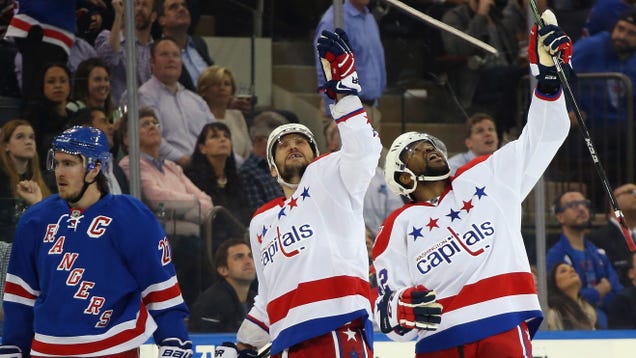
Alexander Ovechkin guaranteed that the Capitals will win tonight’s Game 7. What if the Rangers win? Or, more trickily, what if the Caps win and Ovechkin doesn’t appear on the scoresheet? How would that reflect upon Ovechkin, who (unfairly) has gained a reputation as a scorer who can’t score in the most critical of games?
Joel Ward says, basically, it’s complicated. But he offered the Washington Post’s Dan Steinberg a series of explanations that border on hockey existentialism.
The Caps, he said, can’t call an isolation play for Ovechkin, running a picket fence play or ordering everyone else to the boards while their star barrels in on goal alone. There is nothing wrong with how Ovechkin has approached deciding games: “The mind-set is definitely there to do it,” Ward said. Move this storyline along to somewhere else.
“People talk and debate about it. I get it. I’m just trying to tell you: Hockey’s not that game,” Ward said. “People don’t understand, the sport of hockey is a different beast compared to other sports. You can’t just throw that deep ball in the corner, and it’s up to you to just go and grab it. Things happen. You make a pass, it banks off the boards differently, it goes off a guy’s skate, bounces over there. There’s a lot of variables that go into it. … Hockey is the ultimate beast, man. It’s a crazy sport.”
Ward is making two points here, and both are excellent. The first is about puck luck—there are things a player like Ovechkin cannot control. If he has a wide open look but can’t settle a bouncing puck, it doesn’t mean he choked under pressure. The second speaks specifically to the nature of hockey, a sport that’s more free-flowing and team-oriented than any of the other North American Big Four.
A scorer can’t score (or at least won’t score particularly often) if no one gets him the puck. And unlike in other sports, there are no discrete plays. There is no drawing up a play on a whiteboard. While Barry Trotz can coach in generalities—cycle the puck, have a defenseman cheat up on offense—there isn’t much he can do in any one situation to set up a specific outcome.
He can try to match personnel who work well together. But that’s no easy thing. Trotz has spent all season shuffling wingers to put on the Ovechkin-Backstrom line. While Ward grabbed that spot early in the playoffs, for Game 6 he was shifted down to the second line, which scored all three of Washington’s goals.
One-man goals are few and far between. Chris Kreider’s reflexes, speed, and strength led to one in Game 6, but even that happened on a breakout initiated by some nifty Rangers board play.
Ward, who is gaining a reputation for big goals, was simply in the right place and the right time to punch home a rebound in Game 7 against the Islanders. Same for his Game 7 OT goal against the Bruins in 2012. In Game 1 of this Rangers series, it was Backstrom with the hit and Ovechkin with the nifty pass doing the heavy lifting that set up Ward’s buzzer-beater.
“It isn’t like I went coast-to-coast,” Ward said. “Just sometimes you get a good bounce.”
The common thread in all three of those goals was Ward doing what he does best: going to the front of the net and causing trouble. In tight playoff hockey, where goals are sparse and tend to come off of rebounds and deflections, maybe Ovechkin would score more if he did the same—but that would preclude him from doing what he does best: muscling past defenders, outskating just about everyone, taking rocket shots from his office in the left circle. He’ll undoubtedly be doing that tonight; a big part of whether he succeeds will have nothing to do with him.
The upshot from all this is that Ovechkin’s Game 7 shouldn’t be judged by the scoring column or even by the game’s outcome, but by how he actually plays. (Rick Nash needed until Game 6 to find the net, yet he’s been one of the Rangers’ better players on both ends of the ice all series.)
I don’t believe “clutch” is fully a myth, only a mislabeling. There are regular-season stars who fall to shine in the postseason, either because they can no longer make hay against inferior competition, or because the pressure of the playoffs genuinely gets to them, causing them to overthink their actions or blank and fail to do the fundamental things that have served them so well. Conversely, there are players—Ward seems be one—who aren’t fazed by the tension, or perhaps even thrive on it. Clutch might not be about rising to the occasion, but rather nothing more than possessing the ability to ignore it.



